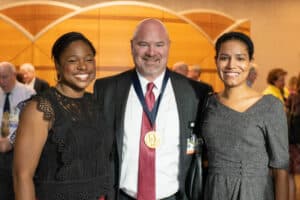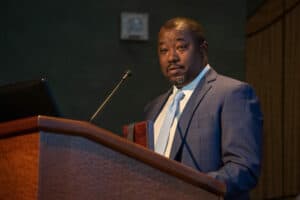J.D. Day, M.D., an internationally recognized leader in skull base surgery and specialist in Gamma Knife surgery and vascular disorders of the brain and skull base at the University of Arkansas for Medical Sciences (UAMS), was invested Oct. 10 in the Robert Watson, M.D., Chair in Neurological Surgery.
“This is probably one of the most humbling days of my life,” Day said. Referring to a map showing his many stops across his medical career, he pointed to a red line that led him to UAMS. “God willing, that red stands for stop, and I will be here for the rest of my career.”
Day is chair of the Department of Neurosurgery in the UAMS College of Medicine.

Day poses with Ebonye Green, APRN, and Analiz Rodriguez, M.D., Ph.D., at the event’s reception
An endowed chair is among the highest academic honors a university can bestow on a faculty member. A chair is established with gifts of at least $1 million, which are invested and the interest
proceeds used to support the educational, research and clinical activities of the chair holder. Those named to a chair are among the most highly regarded scientists, physicians and professors in their fields.
“I’d like to thank J.D. Day for everything that he’s done for UAMS and the people of Arkansas, and for the entire field of neurosurgery,” said UAMS Chancellor Cam Patterson, M.D., MBA. “We are grateful for what you have done and we are grateful for what you will continue to do.”
Robert C. Watson, M.D., known as the father of neurosurgery in Arkansas, was just a teenager in Mena, Arkansas, working in the local drugstore when he discovered he wanted to become a physician. Upon graduation from the UAMS College of Medicine in 1935, he had not decided which specialty he would pursue, but that changed when he cared for a young girl with a brain injury during his internship at Detroit City Hospital. He furthered his training in Brooklyn, New York, at King’s County Hospital, where his fascination with the brain grew.
In 1944, Watson became only the 108th physician to receive accreditation from the American Board of Neurological Society. Watson returned to Arkansas to practice neurosurgery and began a 27-year volunteer career as a teacher, educating young physicians about diagnosing neurological cases.
“Dr. Watson was a pillar of the medical community and here at UAMS,” said Christopher T. Westfall, M.D., UAMS executive vice chancellor and dean of the College of Medicine. “He was truly the father of neurosurgery in Arkansas, and he had an immeasurable impact on our students, our residents, our fellows, and most importantly, to the patients they went on to serve.”
“This investiture celebrates the generosity and philanthropic spirit, and the legacy of Dr. Watson, and we are delighted to celebrate Dr. Day’s leadership and accomplishments with this chair,” he said. “Dr. Day has propelled our Department of Neurosurgery and the Neurosciences Service Line to new heights.”
Watson’s accomplishments included serving as chief of staff of Baptist Medical Center, president of both the Arkansas and Pulaski County Medical Societies, and president and founder of the Southern Neurological Society. He was a founding member and longtime chairman of the Board of Directors of the Medical Education Foundation of Arkansas. In 1980, the neurosurgeons who had joined Watson’s practice created the Robert Watson, M.D., History of Medicine Room in the UAMS Library.
“Dr. Watson truly had a remarkable career,” Day said. “He always worried about his patients like we do, and I’m sure he prayed every day, just as I do, that our patients have the best outcome possible. Some things just will never change in neurosurgery.”

James P. Chandler, M.D., praised Day as “a neurosurgeon’s neurosurgeon.”
Patterson and Westfall thanked the members of Watson’s family who were in attendance.
“I’ll tell you, if I ever had a neurologic or neurosurgical problem, I would fly to Arkansas, to this place, and have John as my neurosurgeon,” said James P. Chandler, M.D., vice chair of the Department of Neurological Surgery and co-director of the Lou and Jean Malnati Brain Tumor Institute of the Robert H. Lurie Comprehensive Cancer Center of Northwestern University. “He is a neurosurgeon’s neurosurgeon. Congratulations, John – this honor is very appropriate and very well deserved.”
“We worked a lifetime together and John became a brother,” said Michael L. Levy, M.D., Ph.D., chief of pediatric neurosurgery at Rady Children’s Hospital-San Diego and the University of California, San Diego School of Medicine. “I think this honor is so appropriate for him because he is everything that this honor represents. He is everything you want in somebody to be in a leadership position, to educate those surgeons – they’re going to be practicing for decades – and to make a difference in the lives of so many people. That’s what John does.”
Day was presented with a commemorative medallion by Patterson and Westfall.
Day thanked members of his family in attendance, as well as the Watson family, and reserved special praise for members of his department, including faculty, administrators, nurses and the scrub techs in the operating room.
“While it would seem like the pinnacle of an academic physician’s career to be invested in an endowed chair, I assure you that this, for me, represents more of a rebirth and a beginning to the next phase,” Day said. “My overall goal, when I’m finished, is that if you’re in Arkansas and you have a neurosurgical problem, you know that you will be delivered the most comprehensive, cutting-edge, up-to-date care that’s available anywhere in the country. That’s my pledge to you.”
Day became chairman of the Department of Neurosurgery in 2010. He was previously an associate professor, vice chair for academic affairs, and the associate residency program director at the University of Texas Health Science Center in San Antonio, Texas.
He earned his Bachelor of Arts in chemistry from Whitman College in Walla Walla, Washington, and his medical degree from the University of Washington in Seattle, Washington. He completed his residency at the University of Southern California LAC/USC Medical Center in 1996 and followed with a research fellowship in cranial base surgery at the University of Vienna Medical School, Neurochirurgische Universitätsklinik in Vienna, Austria. During his residency, Day received the Mahaley Award for Clinical Research from the American Association of Neurological Surgeons.
Day’s clinical interests include brain tumors, cerebrovascular surgery and skull base surgery. His research efforts include refinements of minimally invasive neurosurgical techniques in brain surgery and enhancing early recovery after brain surgery. He has authored four textbooks on skull base surgery and published over 80 chapters and articles on neurosurgical topics. He is a highly sought-after lecturer on skull base surgery techniques and has lectured and served as faculty for courses on four continents.
UAMS is the state’s only health sciences university, with colleges of Medicine, Nursing, Pharmacy, Health Professions and Public Health; a graduate school; hospital; a main campus in Little Rock; a Northwest Arkansas regional campus in Fayetteville; a statewide network of regional campuses; and seven institutes: the Winthrop P. Rockefeller Cancer Institute, Jackson T. Stephens Spine & Neurosciences Institute, Harvey & Bernice Jones Eye Institute, Psychiatric Research Institute, Donald W. Reynolds Institute on Aging, Translational Research Institute and Institute for Digital Health & Innovation. It is the only adult Level 1 trauma center in the state. U.S. News & World Report named UAMS Medical Center the state’s Best Hospital; ranked its ear, nose and throat program among the top 50 nationwide; and named six areas as high performing — cancer, colon cancer surgery, heart failure, hip replacement, knee replacement and lung cancer surgery. UAMS has 2,727 students, 870 medical residents and five dental residents. It is the state’s largest public employer with more than 10,000 employees, including 1,200 physicians who provide care to patients at UAMS, its regional campuses, Arkansas Childrens Hospital, the VA Medical Center and Baptist Health. Visit www.uams.edu or www.uamshealth.com. Find us on Facebook, Twitter, YouTube or Instagram.
